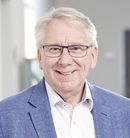Research
News
of
the
University
of
Siegen
 Artificial
intelligence
for
safer
technical
systems Artificial
intelligence
for
safer
technical
systems
With
the
participation
of
the
University
of
Siegen,
the
TRUST-E
research
project
is
developing
innovative
concepts
for
the
holistic
condition
monitoring
of
sensors,
modules,
and
systems.
Advanced
sensor
technology
and
intelligent
control
systems
are
expected
to
function
in
a
trustworthy,
reliable
way
at
all
times,
particularly
in
safety-relevant
applications.
Innovative
concepts
for
the
holistic
condition
monitoring
of
sensors,
modules,
and
systems
are
being
researched
in
the
newly
launched
"TRUST-E"
project,
in
which
Siegen
is
involved.
Click
here  to
read
more.
to
read
more.
 Millions
of
euros
in
funding
for
data
management
in
physics Millions
of
euros
in
funding
for
data
management
in
physics
The
Joint
Science
Conference
of
the
German
Federal
and
State
Governments
has
agreed
to
fund
two
research
consortia
for
an
amount
of
€14
to
€20
million
each.
Around
€2
million
of
which
will
go
to
the
University
of
Siegen.
In
its
meeting
on
July
2,
2021,
the
Joint
Science
Conference
of
the
Federal
and
State
Governments
(GWK)
agreed
to
fund
the
two
consortia
DAPHNE4NFDI
and
PUNCH4NFDI
as
part
of
the
National
Research
Data
Infrastructure
(NFDI).
These
consortia
aim
to
make
research
data
relating
different
areas
of
physics
transparent
and
permanently
available.
Click
here  to
read
more.
to
read
more.
 Go-ahead
for
groundbreaking
research
project Go-ahead
for
groundbreaking
research
project
€15.8
million
in
funding
has
been
approved
for
the
development
a
pioneering
quantum
computer
for
industry
and
science.
The
project
is
being
coordinated
at
the
University
of
Siegen.
.
The
German
Federal
Ministry
of
Education
and
Research
(BMBF)
has
approved
the
application
for
the
joint
project
MIQRO,
thereby
giving
the
go-ahead
for
a
groundbreaking
research
project.
The
city
of
Siegen's
shareof
the
funding
amounts
to
€7.1
million.
The
project
has
a
big
goal:
to
develop
a
pioneering
quantum
computer
based
on
high-frequency
controlled
ions.
Click
here  to
read
more.
to
read
more.
 Rapid
test
for
antibiotic-resistant
germs Rapid
test
for
antibiotic-resistant
germs
Globally,
antibiotic-resistant
bacteria
are
considered
one
of
the
biggest
health
problems.
Researchers
at
the
University
of
Siegen
are
developing
a
nanotechnology-based
approach
to
rapidly
detect
disease-causing
bacteria.
The
current
COVID
pandemic
clearly
demonstrates
how
important
well-functioning
rapid
tests
are
in
medical
diagnostics.
However,
such
tests
are
not
yet
available
for
all
types
of
pathogens.
As
part
of
the
NAPARBA
project,
scientists
from
the
University
of
Siegen
are
working
with
partners
to
research
a
new
approach
to
rapidly
detect
antibiotic-resistant
bacteria.
Click
here  to
read
more.
to
read
more.
 Solution
for
marginal
problem Solution
for
marginal
problem
Physicists
from
Siegen
and
Düsseldorf
have
developed
a
solution
for
the
so-called
marginal
problem
and
publish
it
in
a
renowned
journal.
In
quantum
physics,
systems
of
elementary
particles
are
described
by
wave
functions.
Phycists
are
tryinng
to
find
whether
conclusions
can
be
drawn
about
the
wave
function
of
a
large
molecule
from
wave
functions
of
individual
atoms.Physicists
from
the
University
of
Siegen
and
the
University
of
Düsseldorf
have
now
developed
a
solution
for
this
so-called
marginal
problem
and
published
it
in
the
Nature
Communications
journal.
Click
here  to
read
more.
to
read
more.
 Interdisciplinary
training
in
the
medical
field Interdisciplinary
training
in
the
medical
field
European
training
network
in
the
field
of
biomaterials
launched
with
the
participation
of
the
University
of
Siegen
and
ATTO-TEC,
a
company
originally
spun
off
from
the
university.
According
to
estimates
by
the
RKI,
400,000
to
600,000
so-called
hospital
infections
occur
in
Germany
every
year.
The
spread
of
antibiotic-resistant
bacteria
makes
these
cases
more
difficult
to
treat.
This
year,
the
training
of
the
doctoral
students
begins
with
the
total
of
nine
funded
and
eight
associated
European
partners.
Click
here  to
read
more.
to
read
more.
 EU
funds
doctoral
school
on
artificial
intelligence EU
funds
doctoral
school
on
artificial
intelligence
The
University
of
Siegen
is
receiving
500,000
euros
from
the
European
Union
to
set
up
an
international
doctoral
school.
How
can
artificial
intelligence
help
save
energy
in
private
households?
This
is
what
young
scientists
at
a
new
doctoral
school
at
the
University
of
Siegen
will
be
researching
for
four
years.
They
want
to
find
innovative
approaches
so
that
algorithms
for
saving
energy
in
one's
own
home
are
accepted
by
users.
Click
here  to
read
more.
to
read
more.
 New
cultural
sciences
collaborative
research
center New
cultural
sciences
collaborative
research
center
Deutsche
Forschungsgemeinschaft
(DFG)
supports
"Transformations
of
Popular
Culture"
CRC
at
the
University
of
Siegen.
10
million
euros
of
funding.
The
Deutsche
Forschungsgemeinschaft
(DFG)
has
approved
a
new
collaborative
research
center
(CRC)
at
the
university.
After
the
decision
at
the
fall
meeting
of
the
approvals
committee,
the
CRC
1472
"Transformations
of
Popular
Culture"
can
launch
in
January
2021,
for
an
initial
period
of
four
years.
The
funding
amounts
to
some
10
million
euros.
Click
here  to
read
more.
to
read
more.
|

